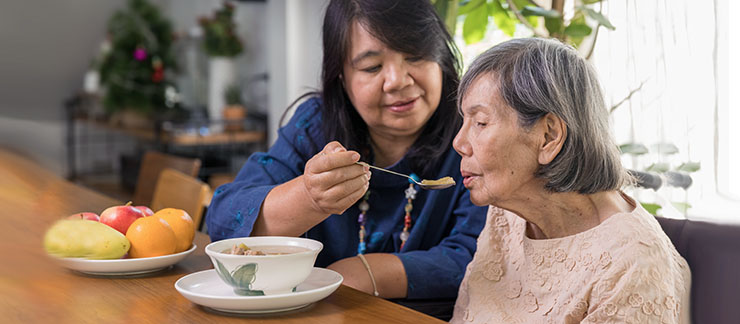
6 Reasons Seniors May Lose Their Appetite
Does your senior loved one struggle to eat during meal times or frequently complain about a loss of appetite? Are they experiencing rapid weight loss or looking frail?
If so, schedule a check-up with their doctor immediately to determine whether their loss of appetite is related to any underlying health problems.
If a health or medical issue is not triggering their eating difficulties, the root of the dilemma could be a common age-related factor.
Common Causes Affecting a Senior’s Appetite
As seniors age, they sometimes struggle with eating or appear to lose their appetite altogether. Many reasons could be the culprit, but common causes can include:
- Changing senses
Changes in taste and smell are common in aging adults. Many seniors develop a reduced sensitivity to flavor, causing previous favorite foods to become bland and tasteless. Some may also develop sensitivity to the smell of certain foods that can lead to reduced appetite.
- Dehydration
Seniors can become dehydrated and not notice it. As a result, they can become dehydrated and experience diminished energy, headaches, and loss of appetite.
- Reduced hunger
Age-related changes to the body can lead to seniors feeling reduced hunger levels, even when they haven’t eaten for some time. A sedentary lifestyle, physical inactivity, and certain medications can also reduce hunger.
- Specialized diets
Health care providers may recommend specialized eating regimens, such as low-sodium or low-carbohydrate diets. Changing diets can cause seniors to dread eating because they have to neglect their preferred foods. Some seniors may also resent being unable to choose their dietary choices.
- Physical impairment
A physical impairment can lead seniors to eat minimally. Mobility problems can make it difficult for older adults to purchase groceries, prepare meals, or reach the pantry. Difficulty chewing, swallowing, or using utensils may also affect their eating habits. Memory loss can also play a part in reduced appetite as seniors may not realize how long it has been since their last meal.
- Mental health
Meals are important social events, but the lack of interaction can cause meal time to be a sad occasion. Depression, isolation, anxiety, and loneliness may lead seniors to skip eating meals.
In-Home Caregivers Can Help Seniors Eat Well
Making sure your senior loved one eats well can feel like a full-time job. If you need additional support, a Visiting Angels senior care provider is available to assist.
Our caregivers can help seniors meet nutritional needs by providing:
- Mealtime companionship
Having a companion during meals can help seniors enjoy eating again. Our caregivers are available to keep them company while they eat, making meals something to anticipate.
- Gentle encouragement and reminders
Our caregivers can encourage your loved one to eat healthy snacks throughout the day, suggest that it is time to take vitamins or nutritional supplements, and remind them of mealtimes without your loved one feeling pestered.
- Meal planning and preparation
Our in-home caregivers can help plan nutritionally balanced meals and assist with grocery shopping and food preparation.
- Assistance with prescribed diets
Our caregivers can help your loved one prepare tasty snacks and meals that align with their prescribed diets. They can help your loved one find enjoyment in meals again while maintaining their health.
- Observation and monitoring
Our in-home caregivers can monitor for concerning signs, keep you and your family informed, and call for emergency assistance when necessary.
Following a healthy nutrition plan can sometimes be difficult for aging adults, but home care support from Visiting Angels will help your loved one benefit from proper senior nutrition and enhanced well-being.
Contact us today! Our care coordinators will discuss your senior’s needs via a free home care consultation.


